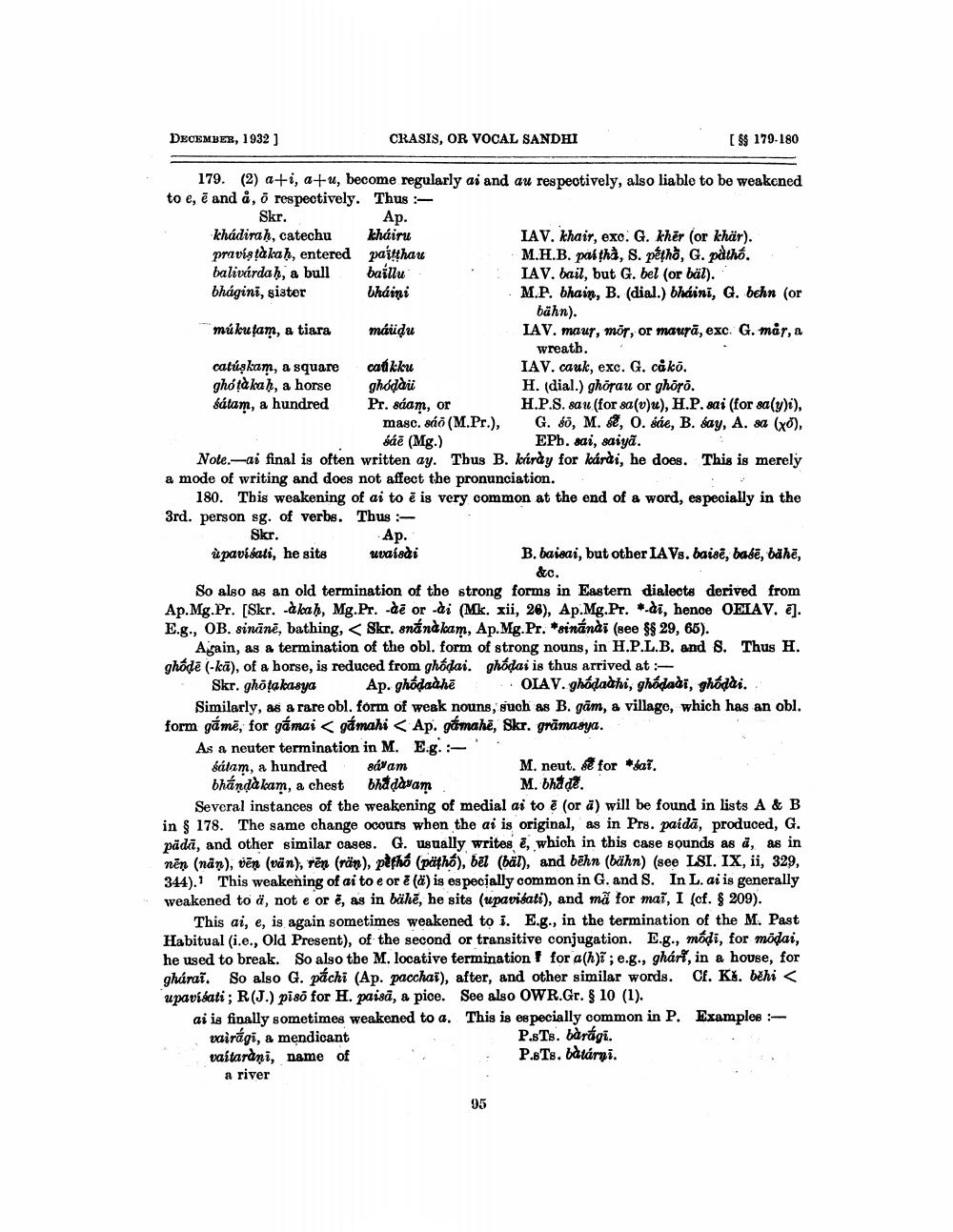________________
[§§ 179-180
179. (2) a+i, a+u, become regularly ai and au respectively, also liable to be weakened to e, é and å, ō respectively. Thus :Skr. Ap. khádiraḥ, catechu kháiru pravis takah, entered patthau balivárdaḥ, a bull bhágini, sister
baillu
bháini
DECEMBER, 1932]
múkutam, a tiara
catúskam, a square ghóṭakaḥ, a horse śátam, a hundred
CRASIS, OR VOCAL SANDHI
máuḍu
caukku ghé dài
Pr. sáam, or mase. sá6 (M.Pr), báẽ (Mg.)
Note.-ai final is often written ay. Thus B. kárdy for kárdi, he does. This is merely a mode of writing and does not affect the pronunciation.
IAV. khair, exc. G. kher (or khär). M.H.B. paitha, S. pétho, G. pàthố. IAV. bail, but G. bel (or bäl).
M.P. bhain, B. (dial.) bháini, G. behn (or bähn).
IAV. maur, mor, or maura, exc. G. mår, a wreath.
IAV. cauk, exc. G. cȧkō.
H. (dial.) ghorau or ghōrō.
H.P.S. sau (for sa(v)u), H.P. sai (for sa(y)i), G. so, M., O. sáe, B. say, A. sa (xo), EPb. sai, saiya.
180. This weakening of ai to è is very common at the end of a word, especially in the 3rd. person sg. of verbs. Thus :Ap. uvaisài
Skr. ùpavisati, he sits
B. baisai, but other IAVs. baise, basē, bahē, &c.
So also as an old termination of the strong forms in Eastern dialects derived from Ap.Mg.Pr. [Skr. àkaḥ, Mg.Pr. àe or -ài (Mk. xii, 26), Ap.Mg.Pr. *.di, hence OELAV. e]. E.g., OB. sinānē, bathing, < Skr. snánakam, Ap. Mg.Pr. *sinandi (see §§ 29, 65).
95
Again, as a termination of the obl. form of strong nouns, in H.P.L.B. and S. Thus H. ghode (-ka), of a horse, is reduced from ghodai. ghodai is thus arrived at:
Skr. ghōṭakasya
Ap. ghodadhë OIAV. ghodachi, ghodadi, ghódài. Similarly, as a rare obl. form of weak nouns, such as B. gām, a village, which has an obl. form game, for gámai < gắmahi < Ap. gámahi, Skr. grimasya.
As a neuter termination in M. E.g.:bátam, a hundred
8ávam bhadavam
M. neut. for sai. M. bhade.
bhandakam, a chest
Several instances of the weakening of medial ai to e (or ä) will be found in lists A & B in § 178. The same change occurs when the ai is original, as in Prs. paidā, produced, G. pädā, and other similar cases. G. usually writes e, which in this case sounds as a, as in nen (nän), ven (vän), rẽn (rän), pèthố (pätho), bel (bal), and behn (bähn) (see LSI. IX, ii, 329, 344). This weakening of ai to e ore (a) is especially common in G. and S. In L. ai is generally weakened to ä, not e or e, as in bähe, he sits (upavisati), and mã for maĩ, I (cf. § 209).
This ai, e, is again sometimes weakened to i. E.g., in the termination of the M. Past Habitual (i.e., Old Present), of the second or transitive conjugation. E.g., modi, for mōdai, he used to break. So also the M. locative termination for a(h); e.g., ghárt, in a house, for ghárat. So also G. páchi (Ap. pacchai), after, and other similar words. Cf. Kš. běhi < upavisati; R(J.) piso for H. paisā, a pice. This is especially common in P. Examples :P.STs. bàrági. P.sTs. batárni.
See also OWR.Gr. § 10 (1).
ai is finally sometimes weakened to a. vairági, a mendicant vaitarani, name of
a river




